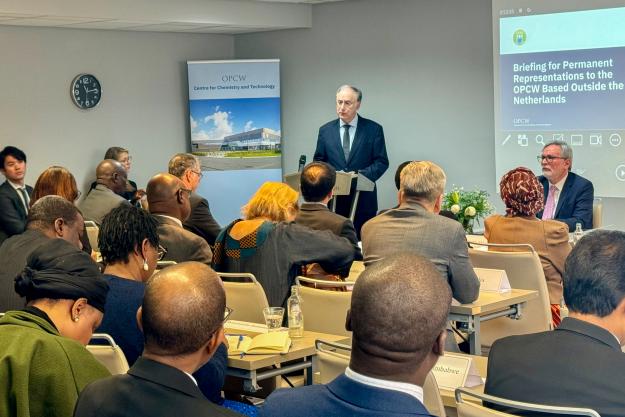BRUSSELS, Belgium—19 November 2024— The Technical Secretariat of the Organisation for the Prohibition of Chemical Weapons (OPCW) held its annual briefing for Permanent Representations to the OPCW based outside of the Netherlands on 13 November 2024 in Brussels, Belgium.
The purpose of the briefing was to assist Permanent Representations in preparing for the forthcoming Twenty-Ninth Session of the Conference of the States Parties (CSP-29), as well as to offer an opportunity to engage with senior staff members of the Technical Secretariat.
The briefing brought together 46 delegates, including 19 Ambassadors representing 30 countries — 29 OPCW Member States and South Sudan, a State not Party to the Convention. This marked the highest number of participants in recent years.
The OPCW Director-General, Ambassador Fernando Arias, briefed delegates and answered questions about the Organisation’s priorities, including on the use and the threat of use of chemical weapons and on the challenges and opportunities presented by emerging technologies, such as Artificial Intelligence (AI).
In his opening statement, the Director-General said: “Active involvement of all States Parties in the work of the OPCW is vital to ensuring that it delivers to reach our collective goals. We face a resurgence in chemical weapons threats and the risk of further erosion of the norm against the use of these inhumane weapons. It is essential that States Parties renew their commitment to the Convention and take the necessary measures to protect it. Your presence here today demonstrates your dedication to upholding these shared values.”

Ambassador Fernando Arias speaks during briefing for Permanent Representations to the OPCW based outside of the Netherlands on 13 November 2024 in Brussels, Belgium.
The Chairperson of the Executive Council, H.E. Ambassador Andres Teran Parral, Permanent Representative of Ecuador to the OPCW, briefed the participants on the Council’s activities, focusing on key discussions and development that occurred in the Council in this year, and addressed questions raised by the participants.
OPCW senior staff also gave an overview of various aspects of the Organisation’s work, such as efforts to address the threat of chemical weapons use, international cooperation and assistance activities, the Africa programme, as well as the OPCW staff recruitment process.
The briefing also featured active discussions and interactions among the delegates of the Member States. The OPCW Deputy Director-General, Ambassador Odette Melono, closed the briefing, highlighting that vigilance and collaborative efforts are needed to achieve OPCW’s mission to free the world from chemical weapons.
The briefing was followed by lunch hosted by the Director-General, where the participants engaged with senior staff members of the Secretariat and received further detailed information related to the activities of the OPCW.
Currently, 85 Permanent Representations to the OPCW are based outside the Netherlands, with the majority located in Brussels. The annual briefing for Permanent Representations held in Brussels serves as a platform for the OPCW Technical Secretariat to bridge the geographical distance and strengthen engagement with the Organisation’s Member States.
Background
As the implementing body for the Chemical Weapons Convention, the OPCW, with its 193 Member States, oversees the global endeavour to permanently eliminate chemical weapons. Since the Convention’s entry into force in 1997, it is the most successful disarmament treaty eliminating an entire class of weapons of mass destruction.
In 2023, the OPCW verified that all chemical weapons stockpiles declared by the 193 States Parties to the Chemical Weapons Convention since 1997 — totalling 72,304 metric tonnes of chemical agents — have been irreversibly destroyed under the OPCW’s strict verification regime.
For its extensive efforts in eliminating chemical weapons, the OPCW received the 2013 Nobel Peace Prize.
